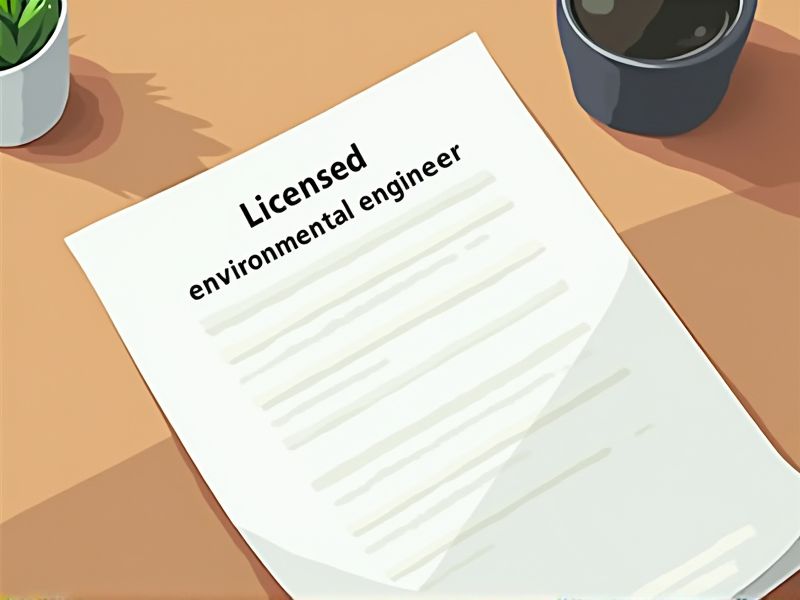
Licensed environmental engineers often require specific certifications to ensure their expertise aligns with industry standards and regulations. These qualifications help demonstrate proficiency in areas such as hazardous waste management, environmental impact assessment, and sustainability practices. Certification not only validates their skills but also enhances credibility with employers and clients seeking environmentally sound solutions. Key certifications for a licensed environmental engineer include those focused on environmental regulations and advanced technical competencies.
Professional Engineer (PE) License in Environmental Engineering
A Professional Engineer (PE) license in Environmental Engineering ensures that an engineer has met specific educational and professional standards, enhancing their credibility and competence. It authorizes the engineer to oversee projects, sign off on designs, and submit plans to public authorities, ensuring compliance with environmental regulations. Clients and employers often require a PE license to trust an engineer's ability to manage and complete projects that have significant public health and safety impacts. Having a PE license may lead to better career opportunities and higher earning potential by demonstrating a commitment to the profession and public welfare.
Certified Environmental Professional (CEP)
A Certified Environmental Professional (CEP) provides validation of specialized knowledge and skills in complex environmental issues for licensed environmental engineers. With increasing regulations and environmental standards, a CEP ensures compliance and mitigates legal risks for projects. Clients and organizations gain trust and credibility when employing engineers with such certifications as they signal expertise. As environmental challenges evolve, a CEP equips engineers with updated methodologies and sustainable solutions necessary for effective project execution.
LEED Accredited Professional (LEED AP)
The presence of a LEED Accredited Professional (LEED AP) enhances an environmental engineer's ability to design sustainable buildings, which can lead to reduced energy consumption and lower operational costs. With increasing regulations and demand for green buildings, a LEED AP credential aligns the engineer's expertise with industry standards, improving their project competitiveness. Clients and employers often seek professionals with LEED credentials, recognizing their specialized knowledge in sustainable practices and commitment to environmental stewardship. Engineers with a LEED AP certification can contribute to a project's eligibility for LEED certification, broadening their opportunities in the construction and design industry.
HAZWOPER Certification
Licensed environmental engineers need HAZWOPER certification to ensure compliance with OSHA regulations when dealing with hazardous waste operations. The certification provides the necessary training to identify and mitigate risks associated with hazardous substances. It equips engineers with the skills to implement safety protocols, minimizing the potential for workplace accidents and environmental contamination. Employers require certified personnel to demonstrate their commitment to health and safety standards in hazardous work environments.
Certified Hazardous Materials Manager (CHMM)
Licensed environmental engineers often encounter complex hazardous material issues, and a Certified Hazardous Materials Manager (CHMM) credential ensures they have specialized knowledge in managing these risks. Incorporating CHMM skills helps in mitigating potential legal liabilities associated with hazardous waste management. This certification provides engineers with advanced expertise in regulatory compliance, ensuring projects adhere to environmental laws. Having CHMM credentials enhances an engineer's ability to develop effective waste minimization strategies, leading to cost savings and environmental protection.
Certified Environmental Auditor (CEA)
A Certified Environmental Auditor (CEA) enhances an environmental engineer's ability to assess and ensure compliance with environmental regulations. This certification verifies an engineer's proficiency in identifying potential environmental risks, contributing to more effective risk management strategies. An environmental engineer with CEA credentials earns greater trust from clients and organizations seeking to demonstrate regulatory adherence and sustainability efforts. Increased scrutiny on environmental impact intensifies the demand for comprehensive audits, making the CEA a critical asset for licensed environmental engineers.
ISO 14001 Lead Auditor Certification
Obtaining ISO 14001 Lead Auditor Certification enables licensed environmental engineers to better evaluate an organization's adherence to environmental management standards, enhancing their credibility and capability in audits. This certification equips engineers with the tools to identify inefficiencies and minimize environmental impacts, aligning with global sustainable practices. With increasing regulatory demands, having this certification helps environmental engineers to offer more comprehensive insights and develop effective compliance strategies. Employers often seek professionals with this certification to ensure their environmental management systems are both effective and reliable.
Certified Sustainability Professional (CSP)
Licensed environmental engineers often focus on technical and regulatory aspects, but may lack expertise in sustainable practices, creating a gap that Certified Sustainability Professionals (CSP) can fill. CSP training equips engineers with skills in life-cycle analysis and resource management, enhancing their ability to implement effective sustainable solutions. Clients increasingly demand sustainability in projects, making CSP credentials a competitive advantage. Incorporating CSP certification can lead to more holistic and future-proof environmental solutions.
Certified Industrial Hygienist (CIH)
Certified Industrial Hygienists (CIHs) bring specialized knowledge in identifying and mitigating workplace hazards, which complements an environmental engineer's focus on sustainable design and compliance. Their expertise in assessing exposure to toxins and ensuring air quality can enhance an environmental engineer's projects, reducing health risks. CIHs help navigate regulatory frameworks effectively, ensuring that environmental engineering projects meet all safety standards. They contribute to multidisciplinary teams by offering data-driven insights on occupational health, crucial for comprehensive environmental management.
Environmental Management Systems (EMS) Auditor Certification
A Licensed Environmental Engineer benefits from an Environmental Management Systems (EMS) Auditor Certification as it provides structured methodology to ensure compliance with international environmental standards. Certification enhances an engineer's capability to conduct systematic audits, identifying areas needing improvement. It supports a proactive approach in managing environmental risks and offers credibility to the engineer's skill set when liaising with regulatory bodies. The certification also increases career opportunities by aligning with organizational and global sustainability goals.
Summary
As a licensed environmental engineer acquiring additional certifications, you can expect to significantly enhance your professional competence and credibility within the industry. This expansion of skills often leads to increased job opportunities and the potential for higher salaries. Employers commonly value certified individuals more highly, viewing them as experts capable of managing complex environmental challenges more effectively. Ultimately, gaining certifications typically contributes to career growth and distinguishes you from your peers.
